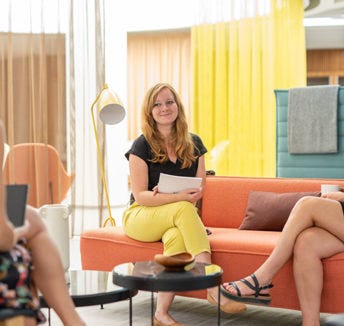
As workers around the world make their way back to the office, many are anxious about reconnecting with colleagues they’ve not seen in months. Here are some tips for revitalising those face-to-face relationships
While working remotely has brought work-life balance benefits for many of us, being out of the office during the Covid-19 pandemic has also affected how we relate to our colleagues.
In some ways, periods of lockdown have pushed us to share more of our true selves at work: whose children, partner or and pets haven’t dropped in on an important video call over the past 18 months? Talking openly about our personal challenges and anxieties during the Covid-19 crisis has also brought some colleagues closer together.
At the same time, though, remote working has chipped away at relationships that were maintained by regular watercooler chats or exchanges around the coffee machine. According to a survey by Achievers, a third of employees in the UK felt disconnected from their colleagues and company culture during the pandemic.
As more and more firms embrace hybrid working – a model that empowers employees to split their time between the corporate office, home and a location near home, such as a nearby flexible workspace – many employees will head back to company HQs for a proportion of each working week.
If you’re feeling anxious about getting back into the groove, these tips should help ease the transition.
Adjust your expectations
After so long spent away, going back to the office might feel a little like the first day of school. You might also find that encounters with people you already know feel odd – almost as though you’re meeting them for the first time.
All relationships – including those with our coworkers – flex and change over time, just as people do. As you return to your company HQ, it’s likely you’ll discover some connections feel quite unlike they did before, as both you and your colleagues may have grown or shifted priorities during the pandemic.
It’s therefore important that you don’t head into the office expecting everything to be exactly as it was before: go in with an open mind, rather than a set notion of how things will look and feel.
When it comes to re-establishing relationships, Ellie Hearne, founder of leadership communications agency Pencil or Ink, stresses the importance of observation and listening. Keeping your body language open, maintaining eye contact with the people around you and taking an interest in what they have to say may be more important than what you bring to conversations yourself. While people may not remember what you say, Hearne argues, they’ll remember how you made them feel.
Start slow, but step outside your comfort zone
A study by the University of Michigan found that social interaction, whether it involves talking or merely being around other people, boosts our general cognitive function. On this basis, hybrid working offers the best of both worlds: the convenience of working at home or near home for some of the time, plus the stimulation of regular face-to-face contact with colleagues.
Before you return to the office, think about the relationships you’re most keen to invest in. Perhaps organise a few coffee or lunch dates during your first few weeks back. Encounters in informal environments, especially if they involve the distraction of food, will allow you to reconnect casually, readying you for the resumption of workplace meetings.
If you live in the same region as a colleague, you could also suggest working from the same flexible workspace occasionally. Coworking alongside a teammate can be a great way to enjoy the benefits of social interaction without the need for a lengthy commute.
Once you’re feeling more confident, think about reaching out and forging connections with colleagues you don’t know so well – or those who’ve joined your organisation during the pandemic. While these conversations might take you out of your comfort zone, they could pay dividends in terms of your career.
Small talk can make a big difference
It’s fair to say that small talk doesn’t come as naturally via a Microsoft Teams call as it might over a cuppa at the office, so you may feel out of practice after so long working from home.
According to career coach Jamie Terran, though, small talk can make a big difference to our career prospects – so it’s well worth investing a little time in. “Building rapport through interaction with colleagues could be the thing that gets you the promotion or keeps you in the role you’re in,” she says. “Rapport is the feeling that allows you to extend a deadline, or overlook smaller mistakes, because it makes it easy for you to remember we’re only human.”
If you’re nervous about making small talk and rebuilding old rapports, Terran suggests a little advance planning. “Whether or not you share personal information about yourself is up to you, but discussing things you truly care about is always the best strategy,” she explains. “Topics relating to your professional field, for example, an article you saw or a book you read, is a great place to start.”
To avoid the dreaded ‘How are you? I’m good, how are you?’ feedback loop, try inserting a reason why you’re ‘good’ into the chat. For example: “I’m good – I listened to a great podcast on the way into work this morning.”
Also, don’t forget the vital role that asking questions can play in helping small talk to flow. Deep down, most people enjoy talking about themselves, so giving someone the opportunity to do so can help cover your own conversational shortcomings if you’re feeling unsure what to say.
Show your appreciation
Finally, it’s worth remembering that everyone likes to feel valued, so showing your appreciation for colleagues is a key way to bolster your connections with them. It may only take a few minutes to write a grateful email, nominate someone as employee of the month or hand-scribe a thank you card, but the return on that investment could be significant.
“Honest, encouraging and thoughtful appreciation costs nothing and yet can mean everything to the people you work with – including your boss,” says career performance coach Jacqueline Dolly. “When we get to know our coworkers and strengthen our bonds with them, it becomes a little easier to meet challenges as a team.”
In other words, saying thank you to someone today could help you to overcome problems tomorrow.
Enjoy this? You might also like these other Spaces magazine stories:
Upskill from anywhere: how the hybrid working revolution has transformed professional development
Smart ways to boost your wellbeing when you return to the office
Share this article
 Read now Hybrid working or a 10% pay rise: what would you choose?
Read now Hybrid working or a 10% pay rise: what would you choose?
 Read now Welcome to the office of the future
Read now Welcome to the office of the future